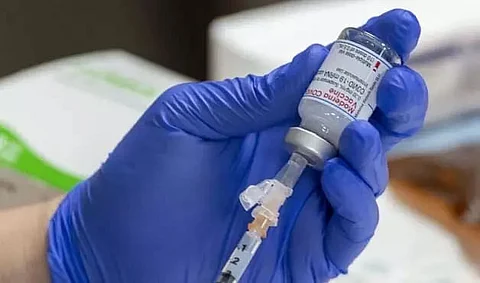
- Home
- Live Blog
- Breaking News
- Top Headlines
- Cities
- NE News
- Sentinel Media
- Sports
- Education
- Jobs

The Central government asking the states to prioritise the second dose of COVID-19 vaccines is an indication that vaccination will slow down over the next couple of months due to shortage. The Ministry of Health has written to all the States to prioritise the second dose over the first dose in a 70:30 ratio. Vaccination gathering fresh momentum will depend on vaccine companies ramping up production. The Central government has informed the Supreme Court that monthly vaccine production would be ramped up to more than 13 crore doses by July-end. The Parliamentary Standing Committee on Science and Technology, Environment, Forests and Climate Change recommended in March to strengthen efforts for ramping up the production capacity of the two approved vaccines – Covishield and Covaxin as well as provide all research, laboratory infrastructure and capacity-building support to the other vaccine candidates in the pipeline, in order to "ensure the availability of a safe, affordable, and efficacious vaccine to the the wider population as soon as possible." The report states that the government apprised the parliamentary panel that planned production capacity for Covaxin, jointly developed by Bharat Biotech and Indian Council of Medical Research is 150 million doses a year while that of covishield, manufactured by the Serum Institute of India (SII) is 70-150 million doses a month. The current shortage is a reflection of failure on the part of the government to anticipate the demand against the targeted population for vaccination. The government has apprised the apex court that the SII has ramped up production covishield from 5 crore doses to 6.5 crore doses a month while Bharat-Biotech has increased production from 90 lakh a month to 2 crore doses a month and further ramp up it to 5.5 crores a month by July. If the production can be ramped up by the target dateline, the flow of vaccine supply to different states can be expected to improve from August onwards. Equitable distribution of vaccines is critical to ensure that second doses are available in time.
Vaccination is a core strategy to prevent the spread of infection to break the chain. Experts have, however, urged not to panic if the second dose is delayed that the recommended interval of four to six weeks in case of covaxin and six to eight weeks in case of covishield. They have also explained that there is no need to repeat the schedule of first and second doses. The vaccine will still be effective in building immunity even if the second dose is taken after the gap of eight to ten weeks. An individual who has received the prime dose will develop immunity only after receiving the booster dose of the same vaccine in the second shot. The Supreme Court suggested door-to-door vaccination. The government, however, explained that administering COVID vaccines door-to-door is unsuitable due to cold chain logistic challenges and the vaccine recipient is required to be kept under observation for 30 minutes for any side effects. North-eastern states require special attention from the Ministry of Health as most of the states in the region are yet to roll out the vaccination for the 18-44 years category. Universal application of the 70:30 ratio in all states may further impact the vaccination of the young people in these states. People in this category account for the majority of those infected and fatalities in the second wave. Delay in full vaccination of the 18 plus category will leave many young people in the region more vulnerable to infection. Every time there is relaxation in restriction of movements enforced by different states to curb infection, the young people in this category are exposed to public life for their educational and livelihood needs as well as jobs and service sector engagements. Majority of several lakhs of migrant workers from northeast belong to this category and prioritising these young population for both first and second doses in the host as well as destination states are important to shield them from infection.
Populations in many remote locations of the region, more particularly in the hill states do not have easy access to healthcare and vaccinating them on a priority basis is critical to building the resilience of the region against the future waves of the COVID-19 pandemic. Resources of states in the northeast being limited, the Central government should consider increasing the allocation of free vaccines for the north-eastern states instead of fixing at 50 per cent of the quota of the vaccines procured through the Government of India route for all states and Union Territories. The special category status of the states in the region under which the 90:10 funding pattern is followed for central sector schemes and projects justifies such special consideration for NE states in the allocation of free vaccines by the Central government. Streamlining the vaccination process is crucial for vaccine scheduling by the states but will depend on the availability of vaccine doses.